Majority of Americans want Congress to pass more gun policy legislation
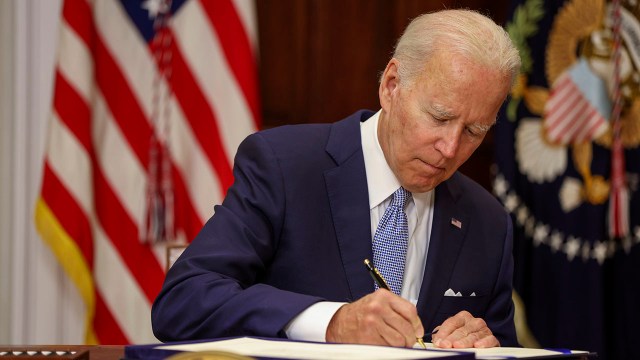
Pew Research Center conducted this study to better understand Americans’ attitudes about the gun law that Congress passed and President Joe Biden signed in June 2022. The study also gauges the public’s attitudes about gun laws more generally. For this analysis, we surveyed 6,174 U.S. adults between June 27 and July 4, 2022. Everyone who took part in this survey is a member of the Center’s American Trends Panel (ATP), an online survey panel that is recruited through national, random sampling of residential addresses. This way nearly all U.S. adults have a chance of selection. The survey is weighted to be representative of the U.S. adult population by gender, race, ethnicity, partisan affiliation, education and other categories. Read more about the ATP’s methodology.
Here are the questions used for the report and its methodology.
Americans are largely supportive of the new gun law passed by Congress and signed into law by President Joe Biden on June 25. Nearly two-thirds of U.S. adults (64%) approve of the new gun law, including 32% who strongly approve. Just 21% say they disapprove of the law, including 11% who strongly disapprove; 15% are not sure.
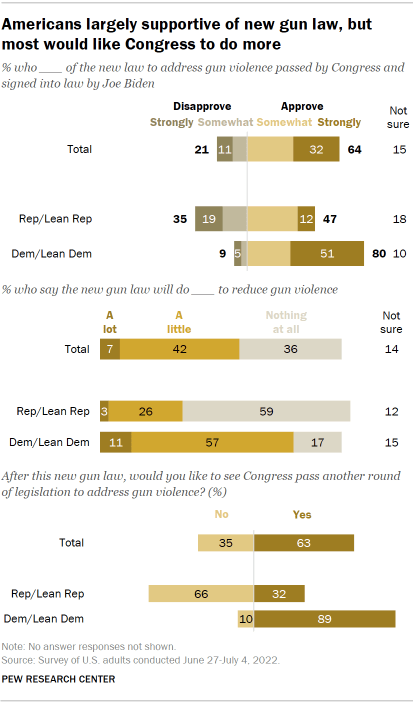
Despite broad support for the new law, however, most Americans are not optimistic it will do much to reduce gun violence in the country: 78% think the new gun law will do a little (42%) or nothing at all (36%) to reduce gun violence. Only 7% say the bill will do a lot, while 14% say they are not sure.
And roughly six-in-ten adults (63%) say they would like to see Congress pass another round of legislation to address gun violence, compared with 35% who do not.
The new Pew Research Center survey was conducted June 27-July 4, 2022, among 6,174 adults. It was conducted amid a series of mass shootings and rising levels of gun violence in several major U.S. cities; it was nearly completed before the shooting at a July Fourth parade in Highland Park, Illinois, which took seven lives.
Republicans and Democrats differ sharply in views of the new gun law, its effectiveness and whether further gun legislation will be necessary. The gun law, passed with bipartisan support in Congress, draws overwhelming support from Democrats and Democratic-leaning independents; 80% approve of the law, with 51% saying they strongly approve.
Notably, more Republicans and Republican leaners approve (47%) than disapprove (35%) of the new law; 18% say they are not sure. However, Republicans who say they have heard “a lot” about the gun law are less supportive of it than those who have heard little or nothing about the law.
While neither Democrats nor Republicans believe the new gun law will do a lot to reduce gun violence, Democrats are considerably more optimistic about its effect (68% say it will do at least a little to reduce gun violence, compared with 29% of Republicans). Nearly six-in-ten Republicans (59%) say the new law will do nothing at all to reduce gun violence, compared with just 17% of Democrats who say the same.
Democrats overwhelmingly support further legislation to address the issue. Nearly nine-in-ten Democrats (89%) would like to see Congress pass another round of legislation, while 32% of Republicans say the same. About two-thirds of Republicans (66%) say they do not want more legislation.
The survey also finds:
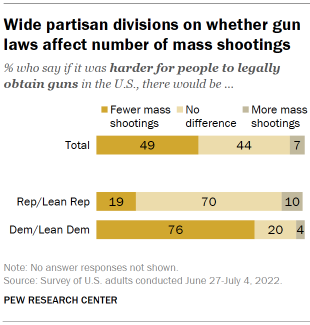
Little change in views of impact of gun restrictions on number of mass shootings. About half of Americans (49%) say that if it was harder for people to legally obtain guns, then there would be fewer mass shootings; a nearly identical share (50%) say this would make no difference or would result in more mass shootings. This is little changed from the last time the Center asked this question, in April 2021. While about three-quarters of Democrats (76%) say making it harder for people to obtain guns would decrease the number of mass shootings in the country, 80% of Republicans say it would make no difference, or it would lead to more mass shootings.
Declining share of Americans say if more people owned guns there would be less crime. Overall, the share of U.S. adults who say that there would be less crime if more Americans owned guns decreased from 31% in 2021 to 24% today. In contrast, the share of Americans who say there would be more crime increased from 34% to 41%. The share that say there would be no difference remains unchanged at 34%.
Persistent divide on priorities for gun policy. About half of Americans (52%) say it is more important to control gun ownership than to protect gun rights; nearly as many (47%) say it is more important to protect the right of Americans to own guns. These views have changed little in recent years and remain deeply divided along partisan lines: 81% of Republicans say it is more important to protect gun rights while an identical share of Democrats (81%) say it is more important to control gun ownership.
Widespread support for new gun bill among most demographic groups
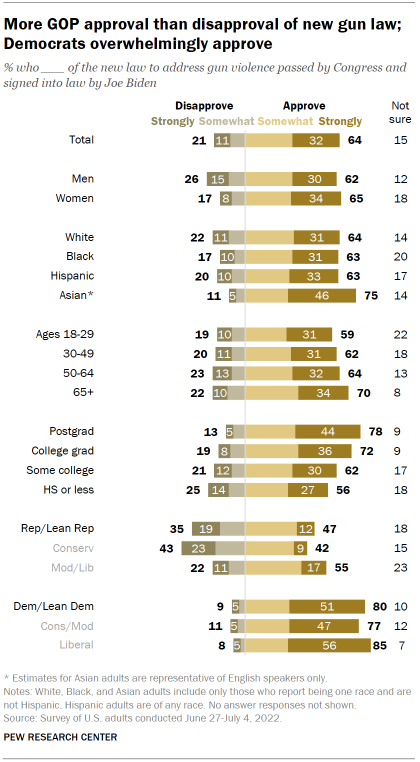
By about three-to-one, more Americans approve than disapprove of the gun bill passed by Congress and signed into law by Biden on June 25. Nearly two-thirds of Americans approve of the bill (64%), with about three-in-ten strongly approving (32%). Just two-in-ten Americans (21%) disapprove of the bill, including 11% who strongly disapprove; 15% of the public is not sure of their view of the law.
About six-in-ten White (64%), Black (63%) and Hispanic (63%) adults approve of the law, as does a larger majority (75%) of Asian Americans.
Majorities of adults across age groups approve of the law, with about two-in-ten disapproving across all age groups. Older Americans (those ages 65 and older) are somewhat more likely to express approval of the law than are younger adults, though this difference is largely attributable to younger adults being less likely to express an opinion (for instance, 22% of adults under 30 say they are not sure, compared with just 8% of adults 65 and older).
Adults with a college degree are more likely to approve of the law than those with less formal education. A slim majority of adults with no college experience (56%) and about six-in-ten of those with some college experience (62%) approve of the law. Larger majorities of those with a bachelor’s degree (72%) and with postgraduate degrees (78%) approve. While just 13% of those with postgraduate degrees disapprove, a quarter of adults with no college experience (25%) disapprove of the law.
In both parties, more approve than disapprove of the new legislation, but support is substantially higher among Democrats than Republicans. Eight-in-ten Democrats approve, with just 9% disapproving; by contrast, about half of Republicans (47%) approve while 35% disapprove. Conservative Republicans are split: 43% disapprove of the bill (including 23% who strongly disapprove), and 42% approve (9% strongly). Moderate Republicans approve of the legislation by more than two-to-one: 55% approve, 22% disapprove.
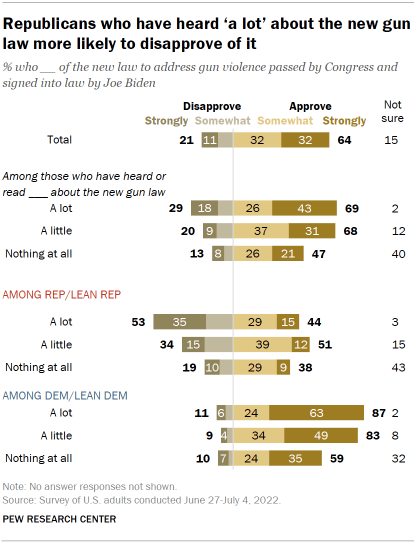
Americans are largely familiar with the new gun legislation: Nearly eight-in-ten say they have heard or read a lot (25%) or a little (54%) about the gun bill signed into law last month; 20% say they have heard nothing at all about the law.
Overall, those who have heard more about the law are more likely to offer an opinion about it, with support substantially outweighing opposition regardless of how much people have heard about the legislation.
Among Republicans, those who have heard or read a lot about the new gun law are more likely to disapprove of it than those who have heard less. About half of Republicans (53%) who say they have heard a lot about the law say they disapprove of it, while 44% say they approve. On balance, Republicans who have heard a little about the legislation approve of it: 51% say they approve, while 34% say they disapprove; an additional 15% say they are unsure about their opinions of the law.
Democrats are largely supportive of the new gun law, regardless of how much they have heard about it. Still, about a third of Democrats who have heard nothing about the law (32%) say they are unsure of their opinion of it.
Many supporters of the gun law say it will do ‘a little’ to reduce gun violence
While most Americans approve of the new gun law, opinions are more divided over how much it will do to reduce gun violence: Just 7% of Americans say it will do a lot, 42% say it will do a little, and 36% say it will do nothing at all; 14% are not sure. A 59% majority of Republicans say the law will do nothing at all to reduce gun violence. By comparison, 57% of Democrats say the law will do a little and an additional 11% say it will do a lot to reduce gun violence.
Among the 32% of the public that expresses strong approval of the bill, about eight-in-ten say it will do a lot (16%) or a little (65%) to reduce gun violence. A narrower majority of those who somewhat approve of the bill (56%) also say it will reduce gun violence at least a little. In contrast, among the 11% of Americans who strongly disapprove of the law, 84% say the law will do nothing at all to reduce gun violence – a view also held by 71% of those who somewhat disapprove of the law.
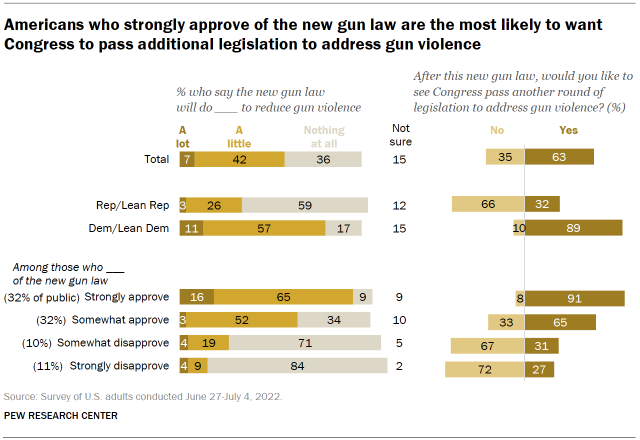
About six-in-ten Americans (63%) would like to see Congress pass additional legislation to address gun violence, although there are deep partisan divides on this issue. Roughly nine-in-ten Democrats (89%) say they would like to see another round of legislation, while just 32% of Republicans say the same.
Those who strongly approve of the bill overwhelmingly would like to see Congress pass additional legislation: 91% say this. About two-thirds of those who somewhat approve of the law (65%) say Congress should take up another round of legislation on this issue. By contrast, 70% of those who disapprove of the law do not want to see Congress take further action.
Gun rights, gun control and the impact of gun ownership on crime
A narrow majority of the public (52%) says that controlling gun ownership is more important than protecting gun rights, while slightly fewer (47%) prioritize protecting Americans’ rights to own guns. As in the past, there are deep partisan divides on this question: Roughly eight-in-ten Republicans (81%) say that protecting gun rights is more important, compared with about two-in-ten Democrats (18%). Overall, Americans’ attitudes on this question have changed little over the past three years.
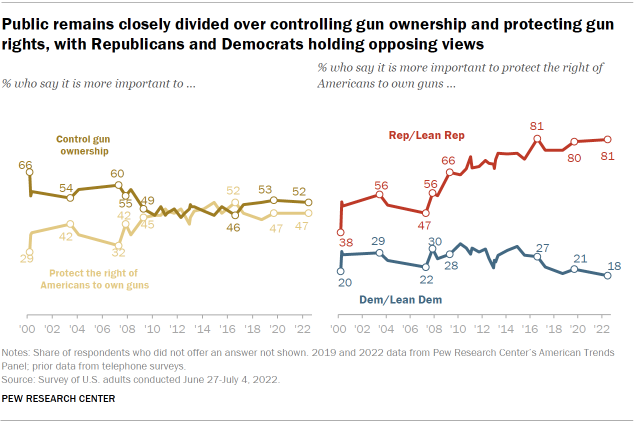
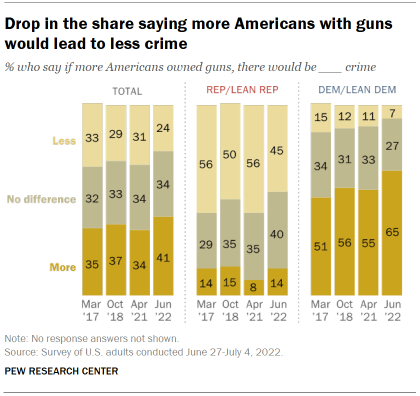
Overall, the share of U.S. adults who say that there would be less crime if more Americans owned guns has decreased from 31% last year to 24% today, while the share saying there would be more crime has increased from 34% to 41%. About a third of Americans (34%) continue to say that if more people owned guns there would be no difference in the amount of crime.
Nearly two-thirds of Democrats (65%) now say there would be more crime if more Americans owned guns, up from 55% last year and 51% in 2017.
By contrast, just 14% of Republicans say that there would be more crime if more Americans owned guns, while 45% say there would be less. While the share of Republicans saying more gun ownership would lead to more crime is little changed in recent years, Republicans are now less likely to say that more gun ownership would lead to less crime than in past years (45% say this today, compared with 56% last year).



